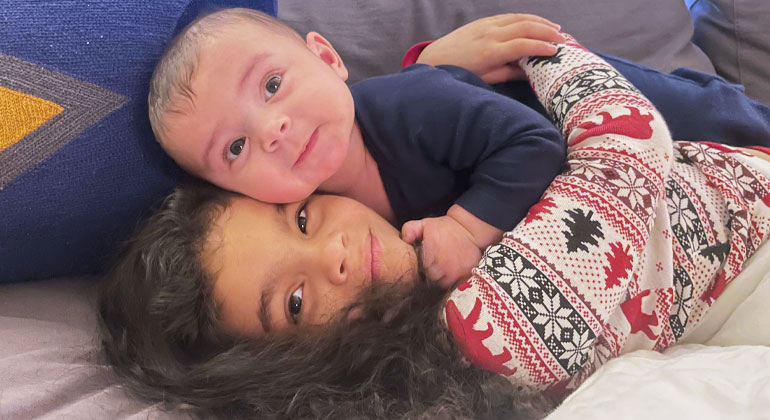
When Expectant Mother Has a Heart Tumor, Two Mount Sinai Hospital Departments Collaborate to Save Two Lives
Open-heart surgery was not what Cree Martinez, age 41, had planned for her pregnancy. But it’s what happened.
When Cree was 25 weeks into the pregnancy, she was diagnosed with gestational diabetes, a condition that often affects women during pregnancy. Cree had had this condition with her first child, so she thought she knew what to expect. She knew it was treatable, but required special precautions. Cree initially saw Noel K. Strong, MD, a specialist in Maternal Fetal Medicine at Mount Sinai, for gestational diabetes, but Dr. Strong eventually guided Cree through an even more complex health journey.
This began when Cree’s obstetrician, Alan Adler, MD, did a routine electrocardiogram (EKG) to check her heart. The test came back normal but indicated that Cree had a possible left atrial enlargement. The obstetrician recommended that Cree get checked by a cardiologist at a New York hospital, who told her it was probably nothing but wanted to make sure.
Cree next saw Lori Croft, MD, Associate Professor of Medicine (Cardiology) at the Icahn School of Medicine at Mount Sinai and director of the Echocardiography Lab at Mount Sinai Heart. Dr. Croft redid the EKG and had the same finding as in the earlier test. She followed up with an ultrasound right away in the examining room. “She did the test and got very quiet, Cree remembers. “You have a tumor in your heart,” Dr. Croft told Cree.
Cree was stunned at the time, but so grateful that Dr. Croft had done the ultrasound. An EKG shows how electrical signals travel through the heart; they’re not always sensitive enough to pick up tumors. Ultrasounds are highly accurate at identifying tumors.
Dr. Croft diagnosed a myxoma tumor, which means the growth started in the heart. These tumors are very rare; most heart tumors start elsewhere in the body. While myxoma tumors are benign, they need to be removed quickly because pieces of the tumor can break off and travel through the blood vessels to other parts of the body. Dr. Croft was concerned that a piece of the tumor might head toward Cree’s brain, block the blood flow, and cause a stroke.
“This put us in a situation where we had to make some difficult decisions,” says Dr. Strong. “This is a condition that is normally treated quite promptly. We had to speak with surgical teams, cardiac teams, nursing teams, and our neonatal intensive care teams.”
Dr. Croft recommended immediate open-heart surgery to remove the tumor. She added that the risk of surgery was the possibility of premature labor. That night, Cree checked into The Mount Sinai Hospital.
Anelechi Anyanwu, MD, Professor and Vice Chair of the Department of Cardiovascular Surgery, performed the procedure and was able to remove the entire tumor. “Open-heart surgery combined with being pregnant was an intense experience,” says Cree. “There was the stress of worrying about the baby and the effects it could possibly have. And on top of that, COVID-19.” Cree also missed her 5-year-old daughter. The whole experience was as challenging emotionally as it was physically, Cree explains. Fortunately, her family was allowed to visit the hospital. Cree remained in the hospital for about two weeks after the procedure.
Recovery from the heart surgery was difficult. “I needed support, and I definitely found that at Mount Sinai,” Cree says. “Dr. Strong was such a special doctor. She was my rock through the whole process; I saw her almost every day, multiple times a day, to check on me and to check on the baby. The nurses and all of the staff just took great care of me and helped me adjust to it all. It was, I think, the best possible experience I could have had.”
At the earliest date, the baby was full-term, Cree’s team tried to induce labor. After about 16 hours, Cree had an emergency cesarean section and gave birth to a baby boy. The infant had to spend a few days in the neonatal intensive care unit but it all turned out well so they were able to leave the hospital together.
The proud parents named their son Leo, which means brave and determined. The name suits him, says Cree, because he’d been through a lot, even before he came out into the world. “My baby is perfect,” says Cree. “I'm so lucky; he saved my life before he was even born!”
About six months later, Cree was still recovering from the surgery and from having a baby. “It's definitely taken me a little longer than I expected, and I still need to get a little bit healthier. But overall, I'm finally feeling like myself again.”
“My story is a great example of how two very different departments worked together to make me feel better,” Cree says. “I could have never done one without the other and I'm forever grateful to Mt. Sinai for this experience!"